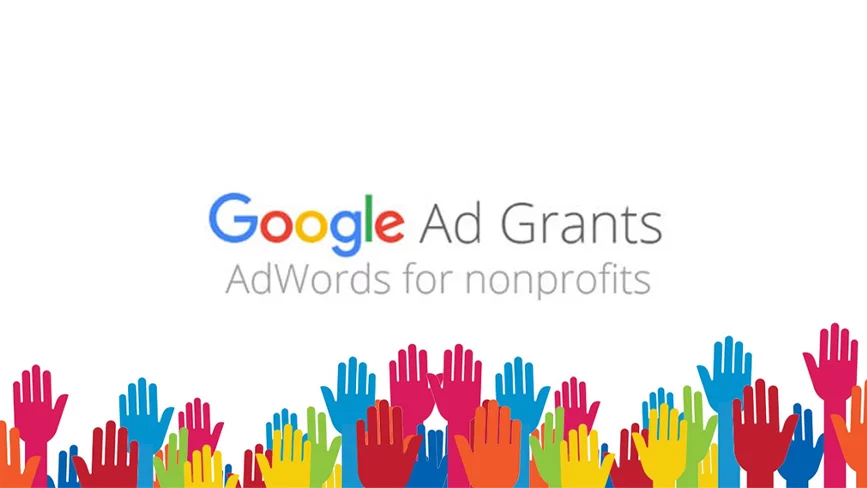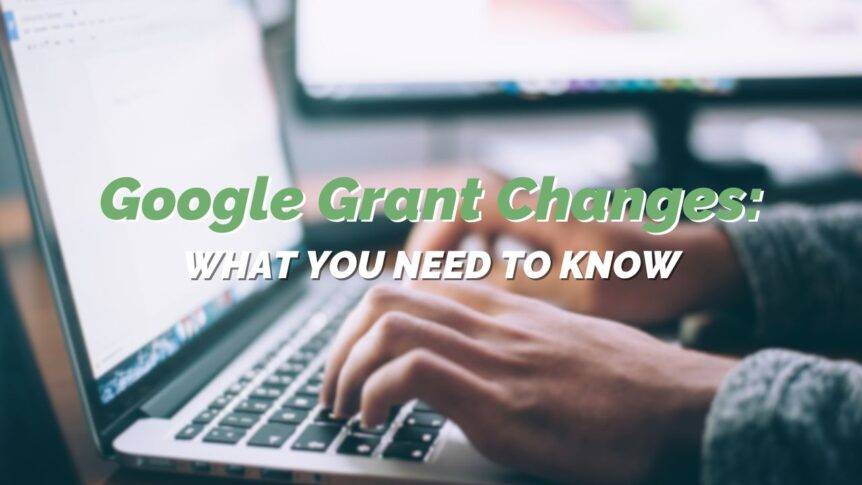Does your church participate in the Google Ad Grants Program? Then you’ll want to make sure you stay up to date with any new policies that Google makes to stay eligible. There are some new Google grant changes that we want to make sure you’re aware of. This incredible program is a great idea for your team if you aren’t part of it already!
Do you want $10,000 every month in Google ad space?
That’s what the Google Ad Grant program can give you. Here at REACHRIGHT we can help your team manage your Google Ad Grant account and make the most out of every dollar. It’s a lot to deal with, and can often feel overwhelming when you’re juggling so many things.
Estimated reading time: 11 minutes
Table of contents
Rules for the Google Ad Grants Program

Let’s start with how your church is eligible for the Google Ad Grant program. There are a few rules that you must follow to participate in this program.
- Hold current and valid charity status (you must have a current 501(c)(3) status).
- Acknowledge and agree to Google Grant’s required termsregarding how to receive and use donations obtained from the grant.
- Have a website that is both functioning and provides adequate detail on your nonprofit.
Your website is incredibly important in this program, as the ads will direct people to your website. Are you looking to improve your church’s website? REACHRIGHT can help with this as well and help you develop a stunning and engaging website.
Limitations
While Google gives $10,000 every month to your account, it equates to $329 in a daily budget. Even if you have multiple campaigns, the budget for the account is still $329 USD per day, and you should split this budget between the campaigns.
You can split the budget equally or give a larger budget to campaigns that are more important for your goals. Even though you’ll be able to technically add higher budgets to your account, the actual spend for the whole account will automatically be capped at $329 USD.
A cost-per-click (CPC) bid cap is the maximum amount that an advertiser is willing to pay per click on their Google Ads campaign. When multiple advertisers are competing for ad placements on a keyword’s search engine results page (SERP), the CPC bid cap helps to select the ad’s position relative to others. Advertisers who bid higher have a higher chance of securing the top ad position. They won’t pay more than their specified CPC bid cap.
Restrictions for keywords:
- No single-word keywords: Your own brand keywords, approved medical conditions, and other cases are exceptions. Google requires you to use a filter to pause single keywords for all others.
- No overly-generic keywords: Your keywords should be specific to your cause. You’ll need to remove or pause overly generic keywords that don’t indicate user intent or indicate a specific audience, like “charity” or “volunteer.”
- No keywords with a quality score less than 3: You’ll need to pause or remove keywords with Quality Scores of 1 or 2. Quality Score is a metric Google assigns to indicate the relevance and qualify of keywords in your Google Ads campaigns. It’s determined by various factors, like the keyword’s expected click-through rate (CTR), your ad relevance, and your landing page experience. A higher Quality Score can lead to better ad positions, increased ad visibility, and lower costs per click.
Google can suspend your account if you don’t maintain compliance each month. This is why it’s very important to stay up to date with any new policies they put into place. Thankfully, the policies don’t change very often, and here at REACHRIGHT we will stay on top of all updates.
Is it worth it?
Yes! Think of all the amazing things you could do with $10,000 each month in Google ad space. Ads are a great way to spread awareness of your church and all that you do. More engagement and interaction brings people to your website and social media accounts which then leads them into your doors and to hearing about God!
How to Apply

Applying for Google Grants will be a process so just know that going in. You’ll have some items to sign that Google will send you, some periods of waiting for responses from Google, and several forms to fill out.
- Set up a Google account for your non-profit organization. (You can start with either TechSoup or Google, the order doesn’t matter. If you already have a Google account starting with TechSoup will make the most sense.)
- You will need your tax ID number from the IRS process above.
- You’ll need your TechSoup token – see step 2 below.
- Register your organization with TechSoup. Google will verify your organization’s non-profit status.
- Make note of your verification token from TechSoup. You will need this to complete the application. The token is a mix of digits and alpha characters.
- Fill out a pre-qualification survey that Google provides via a Google form
- You will need your Google customer ID (do not provide payment information or sign up for the paid version of Google Ads).
- You’ll be required to watch a 5-minute training and take a short quiz which they will provide.
- Approval—this can take 5-10 business days and will require you to walk through the above steps and activate your organization’s Google Ad Non-profit account.
Recent Changes

- March 2003: Google launched the Ad Grants program in the U.S.
- January 2013: Google added the $2 max cost-per-click bid limit and changed the ad auction to place Paid ads above Grant ads.
- September 2013: Google launched AdWords Express (now called Smart Campaigns) for grantees in the U.S., UK, Canada, and Australia which enabled automated campaigns.
- August 2014: The Google Ad Grants team updated the active account management policy to require grantees to sign in at least once per month.
- September 2016: Google stopped accepting applications for the Google Ad GrantsPro program, which provided grantees with more funding.
- January 2018: The Google Ad Grants team launched its new compliance policies to ensure that nonprofits were making the most of the program.
Google has reviewed its policies to add clarity and raise standards of quality for its free advertising grants.
They are also committed to helping you use your ad grant successfully. Review their introduction to Ad Grants video and past live streams. Look out for upcoming live streams, local events, outreach through in-product notifications, and tailored help content to support you more. Connect with members of the Ad Grants team for personalized tips, office hours, and in-person workshops by opting in your preferred email address in your notification preferences, under “Customized Help & Performance Suggestions.” You can also contact them through their active Online Community Forum.
Along with the policies specific to Ad Grants, all Ad Grants accounts must also follow standard Google Ads policies.
More Changes:
- The $2/bid limit has been lifted, but campaigns must install Adwords tracking on their websites.
- Accounts with over 500 clicks a month must also use “Maximize Conversions” bid strategy
- The $329/day and $10k/mo limits remain
- Ad Grants Adwords accounts must maintain a 5% click-through rate (CTR) each month.
- You will receive a notification in Adwords if your account is in jeopardy.
- Adwords Express accounts are exempted from the 5% CTR minimum, and the tracking code requirement because Google automatically manages most of the campaign.
- If the 5% standard isn’t met for two consecutive months, the account will be cancelled.
- Ad Grants accounts must have geo-targeting to show ads in relevant locations.
- Ad Grants accounts must have:
- At least 2 active ad groups per campaign each containing a set of closely related keywords and 2 active text ads
- At least 2 sitelink ad extensions
- The following groups of keywords are off-limits:
- Keywords with a Quality Score of 2 or less
- Overly generic keywords like “free videos”, “e-books”, “today’s news”, “easy yoga”, “download games”, “job alert”, names of places and names of historical events/people
- Branded words that you don’t own like “Urban Outfitters”, “Google”, or any competitor’s branded words
Staying in Compliance
The current policy requires Ad Grant accounts to maintain:
- Minimum 5% CTR account-wide. Accounts will be suspended after 2 consecutive months with a CTR below 5%.
- Minimum keyword quality score of 2
- Minimum 2 ad groups per campaign
- Minimum 2 ads per ad group — This policy will no longer be applicable to Grantees after June 30, 2022, when Grantees must be leveraging responsive search ads.
- At least 2 sitelink ad extensions
Keywords:
- All Keywords must have a quality score higher than 2. You should set up an automated rule that pauses all keywords when they have a quality score of 1 or 2. Alternatively you can change your website and make the keywords more relevant and thereby increase the quality score.
- All keywords must be composed of at least two words and cannot be single-word keywords. There are a few exceptions such as the organization’s brand, but in general, Google wants you to avoid overly broad keywords.
- Similar to the last item, no overly generic keywords are permitted.
Activity:
- You must log in to the Google ad grants account at least monthly
- You must implement changes to the account at least once every 90 days
Clean up your website
- Your ads may only point to the domain approved during your application process, and domains added via the additional domain request form.
- Your organization must own the domain linked from your ad.
- Your website must be functional and high-quality
- Your site must have a robust and clear description of your organization and mission. Each webpage must have sufficient information for visitors to understand your organization’s purpose.
- Your website must function well and not contain broken links.
- Your ads, keywords, and website may not make claims that promise results after a consultation, service, or purchase. Claims on your website must cite verifiable references to provide transparency to users.
- Your website can’t be dedicated to commercial activity
- Commercial activity must not be the main purpose of your website. This includes sales of products and services, consultations, lead generation, and providing referrals.
- Any limited commercial activities must support your non-monetary mission.
- If your organization charges for products or services, your website must describe how your organization uses funds, for example, by disclosing an annual report.
- Your website must have little-to-no ads
- Advertising on your organization’s website must be relevant to your mission and not be obtrusive to users.
- Your website may not host Google AdSense ads or affiliate advertising links. If you’re required to link to an AdSense account to receive payments for the Android market, you’re eligible as long as you don’t display AdSense ads on your website.
Organizations advertising with a grant account are not permitted to bid on:
- Branded keywords not owned by the organization (like “YouTube” or “Google”, or names of newspapers and other organizations)
- Single-word keywords (excluding branded words, medical conditions, and other exception keywords)
- “Generic” keywords like “free videos” or “today’s news”
Maintain 5% CTR
Let’s break down what this means. CTR stands for click-through rate. CTR is the number of clicks that your ad receives divided by the number of times your ad is shown: clicks ÷ impressions = CTR. For example, if you had 5 clicks and 100 impressions, then your CTR would be 5%.
A high CTR is a good indication that users find your ads and listings helpful and relevant. CTR also contributes to your keyword’s expected CTR, which is a component of Ad Rank. Note that a good CTR is relative to what you’re advertising and on which networks.
You can use CTR to gauge which ads, listings, and keywords are successful for you and which need to be improved. The more your keywords, ads, and listings relate to each other and to your business, the more likely a user is to click on your ad or listing after searching on your keyword phrase.
Your account must achieve at least 5% CTR for two consecutive months or your account will be cancelled.
Work with REACHRIGHT

As mentioned above, we can help you manage the google ad grants program. Let us help you sort through all of the policies and changes so that you and your team can stay focused on everything else. The Google Grants program is so beneficial to you and we want to help churches harness all of their potential.
We will compare Google analytics to make sure your ads are reaching their target audience.




